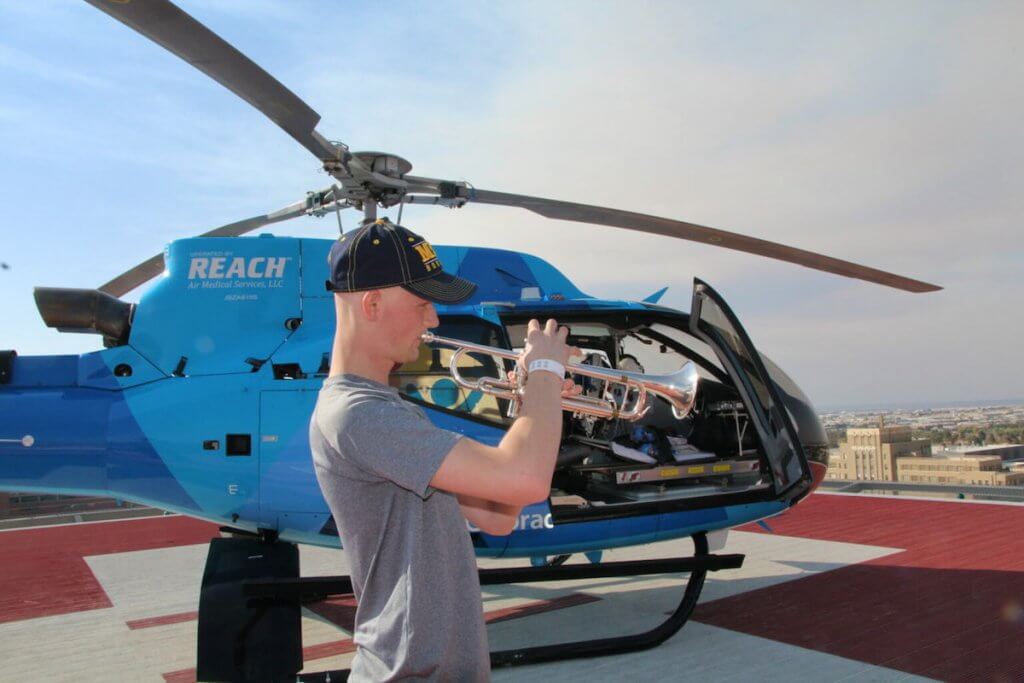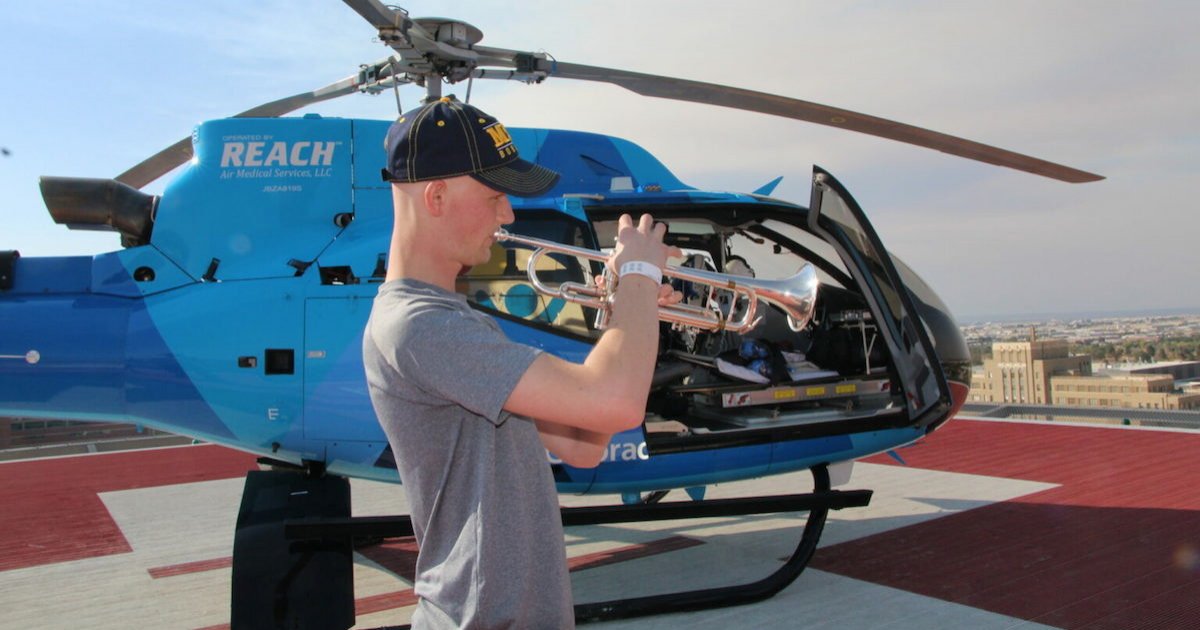The Power of Music
- Luke Heupel, 18, complained of feeling sluggish and having a persistent sore throat and cough. His COVID-19 test came out negative, and after a trip to the emergency room he was diagnosed with acute myeloid leukemia (a type of blood cancer).
- While in the hospital, he was able to cope with chemotherapy treatments by spending his free time playing the guitar and trumpet.
- Acute myeloid leukemia (AML) is a cancer that affects bone marrow, the spongy tissue inside of your bones. Many cancer survivors have told SurvivorNet that they turned to art therapy during treatment in order to find solace.
Last summer, Colorado’s Luke Heupel, 18, complained of feeling sluggish and having a persistent sore throat and cough. Initially he believed it was COVID-19, but tests turned out to be negative for the virus. His symptoms then started getting worse which prompted clinic doctors to send him to the emergency room. Doctors in the ER took a number of blood tests, and Luke was diagnosed with acute myeloid leukemia, also known as AML (a type of blood cancer).
Read MoreTurns out, his music didn’t only help him through treatment but also lent some much-needed positivity to other patients and the hospital staff. His bravery inspired the staff to help him find places to perform, since appropriate rooms inside the hospital were limited. That didn’t stop one of his nurses, Kiley Jurta, from scouring for the perfect spot. They eventually decided the helicopter landing pad on the top of the hospital was the best place.
Whenever he would head to the roof to practice, the staff would visit in order to hear what piece he chose to play for the day. Once completing treatment, Luke realized that he’s gained a whole new perspective on life and what is truly valuable.
“It changes the way you look at the world," Heupel told Colorado Newsline. "Suddenly the little problems don't seem like problems. It makes you appreciate right now. You have to appreciate how precious life is."

What is AML?
Acute myeloid leukemia (AML) is a cancer that affects bone marrow, the spongy tissue inside of your bones. It's a rare cancer overall, but it is the most common type of leukemia in adults. This disease is caused by DNA damage to the cells in your bone marrow that give rise to blood cells. Red blood cells carry oxygen to tissues, white blood cells fight infections as part of the immune system, and platelets help stop bleeding. Those cells are damaged in AML, and the damage results in an overproduction of unnecessary white blood cells.
Due to blood cells being damaged, this can cause symptoms that resemble the common cold or the flu. That’s why getting multiple opinions can be extremely important, since it may be misdiagnosed or brushed off at times.
Related: Acute Myeloid Leukemia (AML) What Are The Symptoms?
“Some of the symptoms that go along with that [are] fatigue, we all feel tired when we have the flu, you can get fevers, you can lose your appetite,” Dr. Mikkael Sekeres, Director of the Leukemia Program at Cleveland Clinic Cancer Center, told SurvivorNet in a previous interview. “That might prompt a trip to the emergency room. Now, somebody may go to the emergency room, or may go to a primary care doctor, and they may say, well, it sounds like you have a virus. Take some aspirin. Take some ibuprofen or Tylenol and let us know if it doesn’t get better in a few days. That person then returns to a doctor’s office or an emergency room because it hasn’t gotten better. At that point, usually, a doctor will draw a sample of blood to check what that person’s blood counts are.”
Dr. Mikkael Sekeres breaks down the basics of acute myeloid leukemia (AML)
The Power of Music
Art therapy such as music, painting, and dancing can really lift up spirits during treatment. It's not uncommon for those battling cancer to experience emotions such as anger, confusion, and sadness. So, the opportunity to express these emotions through artistic outlets can be extremely helpful music is one of those outlets. This was certainly the case for Luke, and has been the case for other cancer survivors.
Two-time cancer survivor, Bianca Muniz, turned to music as an outlet during her experience with cancer. Her cancer journey began at just 11 years old when she was diagnosed with ovarian cancer. Then, at 22 years old, she was diagnosed with breast cancer. Bianca says that undergoing numerous different treatments did have an impact on her voice, but she never let that get in the way of her love of performing, and cancer actually served as a muse for creating new music.
Related: Glam Rock Chemo: How Air Guitar Got This Survivor Through Cancer Treatment
“This experience has had two different effects on my creativity and my music, so I’ve gotten a lot of inspiration from it,” Bianca told SurvivorNet in a previous interview. “But also the side effects of treatment, of chemo, and surgery have definitely had a little bit of a negative effect on my voice. Then again, I love performing. I always feel happy after I’ve performed.”
Learn more about SurvivorNet's rigorous medical review process.


